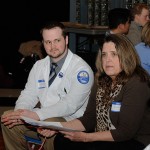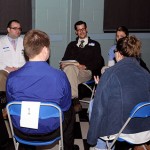Small-Group Discussions Reflect Big-Picture Import of Health Care Collaboration
Published 03.26.2015
News
Nursing & Health Sciences
Healthcare Leadership & Administration
Dental Hygiene
Nursing
Physician Assistant
Radiography
Surgical Technology
Events
Healthcare Leadership & Administration
Faculty & Staff



 As part of an event that spanned northeastern and northcentral Pennsylvania and involved more than 1,000 students at various locations across the region, the sixth annual Collaborative Care Summit convened at Penn College on Wednesday. Nineteen dedicated faculty/staff facilitators from a variety of health professions, including physicians, led discussions in the Bush Campus Center among students from several colleges and universities who are pursuing studies in a wide range of health disciplines. The Collaborative Care Summit is arranged by the Northeastern/Central Pennsylvania Interprofessional Education Coalition – of which Sharon K. Waters, associate dean of health sciences, is a member. Waters coordinated the Penn College event, and co-presented the opening session with Dr. Keith Shenberger, Susquehanna Health TCMC, which brought together about 100 students from Penn College, Lock Haven University, Wilkes University and The Commonwealth Medical College. The students participated in roundtable discussions of a medical case, learning from one another how each discipline contributes to a patient’s care. “The goal of interprofessional learning is to prepare all health professions students for deliberatively working together, with the goal of building a safer and better patient-centered and community-orientated health care system,” Waters explained. “It was impressive to hear what each student contributed to the interprofessional discussion and rewarding to know our students are being prepared to work as a collaborative team toward quality patient care." Student participants represented 10 professions, from paramedic to pharmacy to medicine to nursing. Simultaneous events were held in Scranton and Wilkes-Barre at Marywood University, The Commonwealth Medical College, The University of Scranton, Kings College and Misericordia University.
As part of an event that spanned northeastern and northcentral Pennsylvania and involved more than 1,000 students at various locations across the region, the sixth annual Collaborative Care Summit convened at Penn College on Wednesday. Nineteen dedicated faculty/staff facilitators from a variety of health professions, including physicians, led discussions in the Bush Campus Center among students from several colleges and universities who are pursuing studies in a wide range of health disciplines. The Collaborative Care Summit is arranged by the Northeastern/Central Pennsylvania Interprofessional Education Coalition – of which Sharon K. Waters, associate dean of health sciences, is a member. Waters coordinated the Penn College event, and co-presented the opening session with Dr. Keith Shenberger, Susquehanna Health TCMC, which brought together about 100 students from Penn College, Lock Haven University, Wilkes University and The Commonwealth Medical College. The students participated in roundtable discussions of a medical case, learning from one another how each discipline contributes to a patient’s care. “The goal of interprofessional learning is to prepare all health professions students for deliberatively working together, with the goal of building a safer and better patient-centered and community-orientated health care system,” Waters explained. “It was impressive to hear what each student contributed to the interprofessional discussion and rewarding to know our students are being prepared to work as a collaborative team toward quality patient care." Student participants represented 10 professions, from paramedic to pharmacy to medicine to nursing. Simultaneous events were held in Scranton and Wilkes-Barre at Marywood University, The Commonwealth Medical College, The University of Scranton, Kings College and Misericordia University.